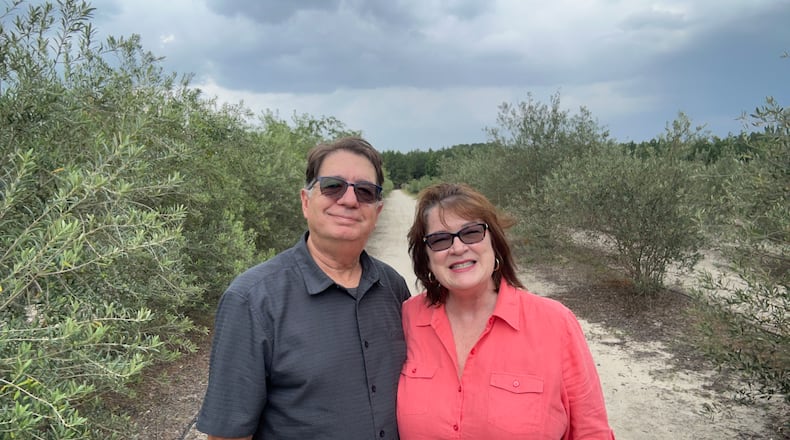Ga. 121 runs roughly parallel to the Georgia coast, about 60 miles inland from the Atlantic Ocean. In Tattnall County, it passes through piney woods, miles of pecan groves, acres of Vidalia onion fields and runs alongside Glennville’s Woodpecker Trail Olive Farm, the home of Tracy and Curtis Poling.
The Polings have planted 9,000 olive trees on a 300-acre longleaf pine plantation — land that has been in Tracy Poling’s family since 1855. They established the olive farm in 2014 and named it for Woodpecker Trail, the official name of the nearby state highway, once a major route for tourists traveling between North Carolina and Florida.
Within six years of starting the farm, their trees had produced an extra-virgin olive oil that won a silver award at the 2020 New York International Olive Oil Competition — the payoff for the untold hours of research they’d done into varieties and growing practices, and their passion for helping build an olive industry in coastal Georgia.
Credit: Handout
Credit: Handout
The New York competition isn’t the only one that has considered the Polings’ oil as award-worthy. This year, they also won their category in the Flavor of Georgia competition run by the University of Georgia.
The Polings offer tours of the olive farm on Thursdays, Fridays and Saturdays, by appointment only. A recent tour started with a trip through the grove and, along the way, Curtis Poling explained why olive trees thrive in the farm’s sandy, well-drained soil, but would fail if planted about 30 feet away, where the soil and light conditions are different. He mentioned that the same type of soil is needed to grow the county’s famous sweet onions.
He pointed out the 10 types of olives that they’re growing — varieties that originated in Greece, Italy, France, Spain, Tunisia and California — and the different growing practices they are trying on their 20 acres of trees. He explained that the trees need at least 350 chilling hours, thrive at temperatures between 85 degrees and the mid-40s, and will sit in suspension during the hottest days of a southeast Georgia summer, until the weather cools.
Credit: Handout
Credit: Handout
Each year, the same climate research that helped the Polings decide they had the right growing conditions for olives also helps them decide on the one optimum day when the fruit should be harvested.
Before the day is out, the couple and their crew have stripped every olive off every branch. The olives are refrigerated immediately, and then go to a local mill, where they are chopped, including the pits, and put through a centrifugal press within 24 hours of harvest, resulting in bright gold, cold-pressed extra-virgin olive oil.
Back in the tasting room after the farm tour, the Polings explained how professionals taste and grade olive oils, including how blue-tinted glasses are used, so the color of the oil won’t prejudice the tasting.
They also shared the standards by which olive oil is judged, the science behind its health benefits, and then they poured thimble-sized samples. Visitors matched their impressions against the criteria used by professional judges — including bitterness, fruitiness and pungency or pepperiness — and discussed the flavors that came to mind as they tasted the oil, such as artichokes, radishes, pepper, citrus and other ripe fruit.
Palates primed, visitors generally are ready to take home a bottle or two. Only two products are available for sale — olive oil and balsamic bourbon vinegar, both in 250-milliliter bottles.
If you’re among those who believe summer isn’t complete without a plate of sliced Georgia tomatoes drizzled with olive oil, you’ll find a visit to the Polings’ farm to be a real treat.
Woodpecker Trail Olive Farm. 2437 Ga. 121, Glennville. 912-266-7577, woodpeckertrailolivefarm.com
Sign up for the AJC Food and Dining Newsletter
Read more stories like this by liking Atlanta Restaurant Scene on Facebook, following @ATLDiningNews on Twitter and @ajcdining on Instagram.
About the Author


